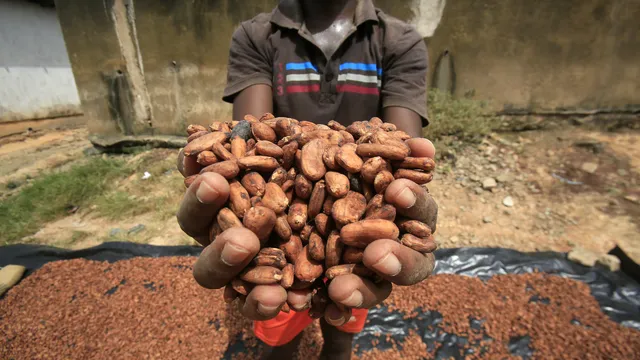Farmers in the region, which accounts for about 70% of global cocoa production, have struggled with heatwaves, disease and unusual rainfall in recent years that have contributed to declining output.
This has led to a sharp spike in the price of cocoa, which is produced from the beans of the cocoa tree and is the main ingredient in chocolate.
A new report states that "climate change, driven primarily by the burning of oil, coal and methane, is leading to an increase in hot temperatures" in Côte d'Ivoire, Ghana, Cameroon and Nigeria.
The study by the independent research group Climate Central found that the trend is particularly pronounced in Côte d'Ivoire and Ghana, the two largest cocoa producers.
Using observational data from 44 cocoa-producing regions in West Africa and computer models, the researchers compared today's temperatures with counterfactuals for a world without the effects of climate change.
They looked at the likelihood that these regions would face temperatures above 32 degrees Celsius - above levels considered optimal for cocoa trees.
The report estimates that over the past decade, climate change has added an extra three weeks of heat above 32 degrees in Côte d'Ivoire and Ghana during the main growing season between October and March.
The researchers say that "excessive heat can contribute to a reduction in the quantity and quality of crops".
They also noted that many other factors can also damage cocoa trees and increase prices, including mealybug infestations, rainfall, smuggling and illegal harvesting.
On 12 February, Christian Aid published a separate study on the vulnerability of chocolate and cocoa farmers to climate change and global warming extremes.
The British charity said conditions in West Africa had changed from extreme rainfall and spoiled crops in the dry season in 2023 to drought in 2024.
"Cocoa farming is a vital livelihood for many of the world's poorest people and man-made climate change is putting this under serious threat," said Osai Ojigo, Christian Aid's director of policy and public campaigns.
Failed harvests have helped drive cocoa prices sharply higher from late 2023 on the London and New York markets, where the commodity is traded.
On 12 February, cocoa prices in New York were above $10,000 per tonne, below the peak of over $12,500 in mid-December.
For decades, prices in New York have fluctuated mostly between $2,000 and $3,000 per ton.
In January, Swiss chocolate maker Lindt & Spruengli said it would raise prices again this year to offset rising cocoa costs.
Narcisa Prikope, a professor at Mississippi State University, said the crop faces an "existential threat" mainly because of increasingly dry conditions in regions where cocoa is produced.
Prikop is part of a recent study by the U.N. Convention to Combat Desertification, which found that more than 3/4 of the Earth's land has become drier in the past 30 years.
Emissions of greenhouse gases, which heat the planet, are the biggest driver of that drying, she said, adding that practices that degrade soils and nature also play a role.
"Collective action against drought is not just about saving chocolate - it's about preserving the planet's ability to sustain life," she said. | BGNES

 Breaking news
Breaking news
 Europe
Europe
 Bulgaria
Bulgaria







